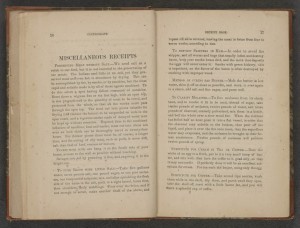While the Civil War imposed hardships on both sides, the South found it particularly difficult to adapt to new realities of daily life. The blockade of Southern seaports and the prohibition of trade with the North quickly depleted food supplies throughout the Confederacy. Farmers became soldiers, and a large percentage of crops were used to feed the troops in the field.
However, these deprivations forced Southerners into resourcefulness. Just as they devised new weapons in fighting the enemy, they also developed ways to fight disease, hunger and food spoilage. Cooks and homemakers were driven to invent substitutes for the most basic foods and beverages.

“Confederate Receipt Book.” Richmond, Virginia: West & Johnston, 1863. Confederate States of America Collection, Rare Book and Special Collections Division, Library of Congress
“The Confederate Receipt Book: A Compilation of Over One Hundred Receipts, Adapted to the Times” (Richmond, West & Johnston, 1863) was compiled from practical receipts (or recipes), which had appeared in Southern newspapers since the beginning of the war. The tome will be on view in “The Civil War in America” exhibition opening Nov. 12.
The only cookbook printed in the South during the war, the “Confederate Receipt Book,” contains recipes for apple pie without apples, artificial oysters, slapjacks, peas pudding and several different ways to make bread.
The book also provided tips for preventing waste, suggestions for substitutions and instructions for economizing and doing without. Those without money or transport would have welcomed suggestions for making bad butter usable or fashioning a lamp wick out of a clean, cotton stocking. Since salt was virtually impossible to buy, a method of curing bacon with precious little salt was extremely useful. In an effort to fend off insect infestation in such cured meats, there was even a suggestion to “prevent skippers,” the nickname of that time for insects such as locusts and grasshoppers.
According to the “Receipt Book,” a substitute for a splendid cup of coffee was described as “ripe acorns, washed and dried, parched until they opened and then roasted with a little bacon fat.” Cream for the coffee was the white of an egg, beaten to a froth, and mixed with a bit of butter.
Ladies, unable to purchase new frocks, appreciated the hints for altering, cleaning and refreshing worn garments, as well the tip of turning petticoats back to front to make them last twice as long.
Home remedies set forth in the “Receipt Book” included cures for such common ailments as chills, corns, warts and asthma.
According to Constance Carter, head of the Science Reference Section in the Library’s Science, Technology and Business Division, one can only assume this compilation was received as gratefully by homemakers in the 1860’s as books on rationing, thrift and wartime meals were during subsequent wars.
The compilation is mentioned more than once in the Science Reference Section’s “Food Thrift: Scraps from the Past” webcast as are many of the trials and tribulations faced by the blockaded South.
You can read about other items in “The Civil War in America” exhibition in these previous blog posts:
